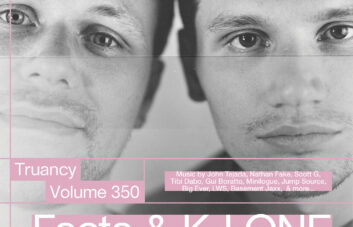“Different feelings… this is doing one feeling, this is doing another feeling, or is this maybe doing a sad feeling, this may be doing, like a happy feeling!” So professes an excited voice at the beginning of the Black Is Beautiful-esque “Say Word”, summarising the potent duality of Mo Kolours’ self-titled debut. Even the artwork’s face represents this mixture, at first appearing stunned and tearful, though later glances accentuate the unrevealing expression, a shapeless mouth that can appear appreciative, upset or completely straight depending on the mood of the beholder. A face that might reflect our own expression; with a tear that follows wherever we allow it to. Mo Kolours is Joseph Deenmamode, half-English and half-Mauritian, and combining the fact with his early love of A Tribe Called Quest and his residence beneath the wing of Gilles Peterson, it feels easy to pave the road his music could take in our heads. But for all the talk of his Mauritian heritage and his channeling of its native sega music, Deenmamode’s debut sounds like his home: London. Influences ranging from hip-hop and dub to funk and calypso are threaded throughout Mo Kolours, always in the same direction and never clashing; Deenmamode’s music seems to exist aloof of any rules or distinctions, much like the people of the UK’s ethnic melting pot. Mo Kolours is the sound of the bustle that brings a city to life, sometimes under sun yet often overcast with grey, and always carrying a sense of wistfulness.
Stream: Mo Kolours – Say Word (One-Handed Music)
It begins at “Brixton House”, birthed with the cries of a baby, then developing into a woozy collage of scholarly wisdom, human claps and folk music. The loose and sporadic blend in the opener sets the tone for the rest of the album – formatted from the perspective of an instrumental hip-hop beats album that builds loops up and breaks them down. Hip-hop is at its most tangible in the boom-bap of “Play It Loud (In Your Car)”, a track that sounds like it would be a skit on an old-school rap album with a synth that ambles along with Deenmamode’s smooth vehicle soliloquy. The lengthy tracklist of short tunes comes as little surprise from a beatmaker so influenced by J Dilla, whose presence is felt throughout the album’s rough, fuzzy instrumentation. Deenmamode’s use of actual instruments for the beats also contributes to the lo-fi coarseness of it all, though it only feels realer because each instrument is jammed with rather than played. Take the Carribbean “Curly Girly”, a track where guitar licks feel their way across the beat and Deenmamode’s singing sounds like it could be completely ad-libbed. His use of his own voice is another manifestation of his desire to explore as many avenues as possible, at times just hums and grunts, other times spoken word or singing in the forefront on the soulful “Little Brown Dog”. On “Mike Black”, the second-longest track at just over three minutes and also the closest thing to a ‘song’ in terms of structure, Deenmamode quietly cries out his worries in a way similar to Jai Paul’s muted delicacy. Even as he repeats the mantra, “For the truth is love as our men say,” the exact words seem to elude the ears as the vocals are wrapped around the instrumental layers with little distinction made between them. He sounds aged, perhaps wise, on the sombre “In Her Eyes (Funk Heart)”, a dark, funk-tronic jam where he voices a homies-gather-round storytelling cadence á la “Ms. Fat Booty”.
Stream: Mo Kolours – Mike Black (One-Handed Music)
Despite the upbeat, bittersweet last-summer nostalgia that courses through the record, Mo Kolours has its own sinister underbelly. The sheer dread and finality that crashes against the cymbals on “Take Us” haunts long after the interlude of merely thirteen seconds. There’s an intimidating, Afro-shamanistic vocal performance on both “Shepherd” and “Natural Disasters Wish List”, the latter littered with prophecies of doom over a warbling bassline. “Child’s Play” juxtaposes playground chants with gunfire and police sirens with relative inconspicuity thanks to innocuous bass guitar and easygoing, uplifting brass as Deenmamode reflects the inevitable loss of innocence to a mindless struggle. The African influence makes cameos both subtle and unsubtle on the record, certainly on “Afro Quarters”, an instrumental that finds its groove almost instantly. Rustic percussion lays a foundation for laid-back West African hand drums and looped cymbal work interspersed with occasional electro-funk. Not only does the track avoid heading in any particular direction, it seems to pause the passing of time around it, existing in its own static bubble apart from the rest of the album.
Stream: Mo Kolours – Play It Loud (In Your Car) (One-Handed Music)
Ultimately, Mo Kolours is an album of moments, all stacked up against each other to form a cohesive snapshot of life – apart from “Lighter Break” wherein all the moments run through one’s thoughts all at once. It’s hard to pinpoint the sound of Deenmamode, largely because his work feels sample-based. We can’t help but assume there are samples on the record, for example during the dying seconds of “Love for You (Humbeat)”, though by and large it comes across as an album of purpose-built samples. One of these productions that function as samples could be the opening seconds of “Curly Girly”, with onomatopoeic ad-libs that ring out in the mind after the moment’s passed. As a result of the massive influx of influences on it coalescing around the beats format, Deenmamode’s debut makes for an astonishingly versatile record; you can play it at a gathering with friends, maybe a barbeque, or quietly to yourself at night, or “Play It Loud (In Your Car)”, reflecting on it, focusing on it, getting lost in it, working to it – it’s so natural in its intricacy and so detailed in its effortlessness. There are moments for everyone to take away from Mo Kolours, moments to remember it by, thus we all might see something different when we gaze upon its cover.



